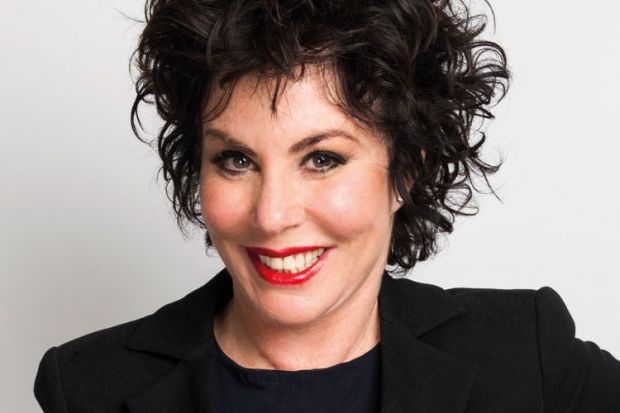Ruby Wax is widely known as a comedian, actor and television personality. In 2013, she completed a master’s degree in mindfulness-based cognitive therapy at the University of Oxford and published Sane New World: Taming the Mind. She is currently working on another book about mindfulness and works widely as a campaigner, seeking to end the stigma surrounding mental health. In June, she was appointed visiting professor of mental health nursing at the University of Surrey.
Where were you born?
Chicago
How has this shaped you?
I don’t know if it has. I know my sense of humour comes from there, probably. It got really sexy and interesting once I left; the architecture improved.
Did you ever envisage yourself as an academic?
Clearly, I never did. I was terrible in school. Really bad. Dangerously bad. I did get into a couple of universities, but I just snuck in there. I was never interested but now I’m hooked on this brain thing. It’s like figuring out a puzzle, how it works, and it’s so relevant to me.
Sane New World is about dealing with the information and sensory overload of the 21st century. When did we lose sight of the simple things, and what’s your advice to people who are feeling overwhelmed?
I think [we lost sight of the simple things] when too much [information] – and I’m not complaining about it – became accessible. I’m as alarmed with what’s happening around the world – which I’ll hear about even if I don’t watch television – as I am that my house is on fire. You’re in that high state of alarm, because you’re getting the information. Entitlement has also driven us nuts – [it creates] the internal question: why can’t I do that [thing that other people are doing]? Now you’re competing against everybody else when you should be saying: “I’m not a jogger, why am I running here? I’m killing my knees.” You’ve got to be trained [to cope with this overwhelming situation].
Tell us about your new book.
The audiences in some of my shows have said that they want to know what to do with their kids, their babies, their teenagers – it’s out of control. And I say: “I'll get back to you.” So I’m now studying the brain of the baby, the teenager and the child and then making appropriate exercises for them; not only mindfulness but also ways to cool [down] their bodies. There’s obviously a niche job here.
If you were a prospective student facing £9,000 fees, would you go again or get a job?
Straight to work, unless I was studying liberal arts like they do in the US. But I wouldn’t specialise [in a subject] now. What if you don’t get the job or you’re not interested?
What kind of undergraduate were you?
Rebellious. I wasn’t concentrating, nothing was interesting except my social life. We were free. It was a time to do what you wanted to do because we didn’t care, who cared? And there was no fear.
What’s your most memorable moment at university?
Hitch-hiking to Mexico in the middle of the night, just on a whim. And then staying there for a few months with my parents calling up to find out where I was. My friend kept saying I was in the shower for a month. But then, I must have liked [studying] psychology because I stuck around.
As a child, what did you want to do when you grew up?
Be a mermaid, and a fireman.
Do you still want to be a mermaid or a fireman?
Well, if it’s available. Maybe not the fireman. That fantasy goes away because someone tells you [that] you can’t have that job.
What advice would you give to your younger self?
I wish I’d started earlier [in this field]. But I wouldn’t have been an academic.
What do you do for fun?
I travel – but now it’s five-star! I used to sleep in cars.
What are the best and worst things about your job?
Nothing’s bad. Except my still high amount of dopamine and obsession to get it right. I still have my perfectionism, but that’s always been [the case]. It makes me tired, and it could burn me out – like this book. It’s like labour that’s gone on for two years.
What one policy would you implement if you were higher education minister for the day?
You’ve got to educate people’s minds. They’ve got the gym, that’s important, but their minds need exercise. Give them time to learn how to use their machine. It’s not airy-fairy; in the end it’s going to get much better results. Train them in cognitive therapy, something where they can study themselves before they throw themselves into the fire. The way children are educated nowadays is appalling. Look around, it’s not my imagination. A lot of schools have this going now but a little more publicity wouldn’t be bad.
POSTSCRIPT:
Article originally published as: HE & me (30 July 2015)
Register to continue
Why register?
- Registration is free and only takes a moment
- Once registered, you can read 3 articles a month
- Sign up for our newsletter
Subscribe
Or subscribe for unlimited access to:
- Unlimited access to news, views, insights & reviews
- Digital editions
- Digital access to THE’s university and college rankings analysis
Already registered or a current subscriber? Login





